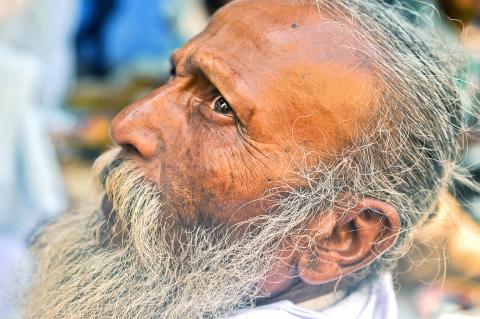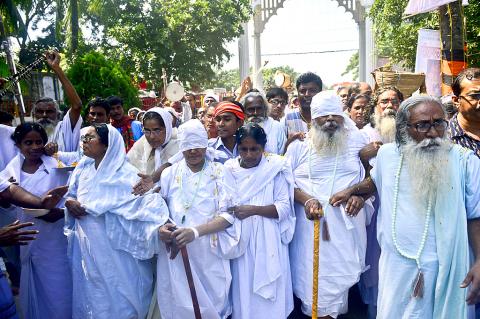After giving up all worldly possessions, they wander the Bangladesh countryside dressed in white robes, singing of peace and love for all with their single-stringed ektaras.
Bangladesh’s “mystic minstrels” have long been dismissed as hippies and even attacked and killed after being branded heretics in the Muslim-majority country.
According to their leaders, Bangladesh’s minstrels, known as Bauls, are growing in popularity, even attracting members of the rising middle class with their ethos of inclusion and rejection of consumerism.

Photo: AFP/Munir uz Zaman
“More and more people are drawn to Baul philosophy and its humanism despite the attacks and daily humiliation,” said Mohammad Aynuddin, 35, an English teacher at a state school who describes himself as a Baul enthusiast.
Originating in Bengal in the 17th century, the sect was popularized by musician and social reformer Lalon Shah whose moving songs of religious tolerance inspired poets and thinkers of the time.
Many ascetic Bauls renounce the modern world and travel on foot from town to town singing and begging alms, staying at ashrams, but have no fixed address. Others choose to remain in their homes, but live a quiet, secluded life of music and worship.

Photo: AFP/Munir uz Zaman
Strongest in west Bangladesh and across the border in India’s West Bengal, the sect’s philosophy is a mix of Hinduism and Sufism rather than one specific religion — angering some Islamic hardliners.
Last month, suspected Islamist militants hacked to death a popular sociology professor who had held weekly meetings on Baul philosophy and also pushed for a ban on the full-face veil on campus.
Although police are still investigating, the professor’s son and his colleagues believe both moves enraged religious fanatics.
In August, Muslim villagers also attacked a group of wandering Bauls, hacking off their beards and hair and forcing them to recite Islamic prayers, according to the Daily Star.
‘TODAY I’M A BEGGAR’
But such attacks failed to dent the mood recently at Lalon’s shrine in a remote western village, where sect members new and old, gathered to mark the 124th anniversary of the singer’s death.
Blindfolded, with their hands tied and draped in white death shrouds, new recruits Aftab and Saleha were led around the shrine, while dozens sang and played their ektaras and drums, in a lively initiation.
The 70-year-old husband and wife, who both use only one name, have handed over their prosperous restaurant in Dhaka to their children, to spend the rest of their lives roaming the country singing.
“Today I’ll become a beggar. I’ll live by begging and won’t care about worldly affairs,” the worshippers sang as the pair — dressed in the shrouds to symbolize their “last journey as free souls” — walked around the shrine seven times.
Thousands of Bauls took part in five days of singing and other celebrations for Lalon in late October in the border town of Chheuria where he once established an ashram for his followers.
“From now on their religion will be humanism. They’ll be neither Muslim, nor Hindu or Christian,” said Banat Ali Fakir, who became a Baul seven years ago, as he watched the initiation. After taking a two-day vow of silence, the new recruits were expected to beg rice and other food from adjoining neighborhoods to host a feast for their fellow followers.
“In the past only a few hundred people would visit the shrine daily,” shrine caretaker Mohammad Ali Fakir told AFP.
“Now there are days we see 2,000 to 5,000 people. More and more people are becoming Bauls as its core message is humanism. It does not differentiate between peoples or castes,” he said.
‘WON’T FIGHT BACK’
Some Bauls expressed concern about the recent attacks, saying that, with just a musical instrument, they are vulnerable and unable to defend themselves as they travel around singing.
“They ask us: why don’t we say our Islamic prayers or fast during the month of Ramadan? They warn that nobody will join our funeral prayers,” Baul enthusiast Aynuddin said, describing the response of his Muslim fellow villagers.
But Baul researcher and writer Saymon Zakaria said the attacks are “nothing new” although he conceded they are growing amid a rise in the number of “hardline Islamists in rural areas who see the Bauls as a threat”.
“Most Bauls simply ignore these attacks and live a quiet life among villagers. They are mainly pacifists who won’t fight back,” he said.
Bauls are growing in numbers in cities because of their “pastoral appeal” although there are no official figures.
Baul philosophy is even spreading to Western countries like Japan because “it’s a kind of rebellion against consumerism. It is also a new fashion,” according to Zakaria.
“People are tired of straight jacket rituals. They seek peace and salvation and they find that in Lalon Shah’s songs and Baul lifestyle,” he said.

Last week the story of the giant illegal crater dug in Kaohsiung’s Meinong District (美濃) emerged into the public consciousness. The site was used for sand and gravel extraction, and then filled with construction waste. Locals referred to it sardonically as the “Meinong Grand Canyon,” according to media reports, because it was 2 hectares in length and 10 meters deep. The land involved included both state-owned and local farm land. Local media said that the site had generated NT$300 million in profits, against fines of a few million and the loss of some excavators. OFFICIAL CORRUPTION? The site had been seized

Next week, candidates will officially register to run for chair of the Chinese Nationalist Party (KMT). By the end of Friday, we will know who has registered for the Oct. 18 election. The number of declared candidates has been fluctuating daily. Some candidates registering may be disqualified, so the final list may be in flux for weeks. The list of likely candidates ranges from deep blue to deeper blue to deepest blue, bordering on red (pro-Chinese Communist Party, CCP). Unless current Chairman Eric Chu (朱立倫) can be convinced to run for re-election, the party looks likely to shift towards more hardline

Sept. 15 to Sept. 21 A Bhutanese princess caught at Taoyuan Airport with 22 rhino horns — worth about NT$31 million today — might have been just another curious front-page story. But the Sept. 17, 1993 incident came at a sensitive moment. Taiwan, dubbed “Die-wan” by the British conservationist group Environmental Investigation Agency (EIA), was under international fire for being a major hub for rhino horn. Just 10 days earlier, US secretary of the interior Bruce Babbitt had recommended sanctions against Taiwan for its “failure to end its participation in rhinoceros horn trade.” Even though Taiwan had restricted imports since 1985 and enacted

Enter the Dragon 13 will bring Taiwan’s first taste of Dirty Boxing Sunday at Taipei Gymnasium, one highlight of a mixed-rules card blending new formats with traditional MMA. The undercard starts at 10:30am, with the main card beginning at 4pm. Tickets are NT$1,200. Dirty Boxing is a US-born ruleset popularized by fighters Mike Perry and Jon Jones as an alternative to boxing. The format has gained traction overseas, with its inaugural championship streamed free to millions on YouTube, Facebook and Instagram. Taiwan’s version allows punches and elbows with clinch striking, but bans kicks, knees and takedowns. The rules are stricter than the